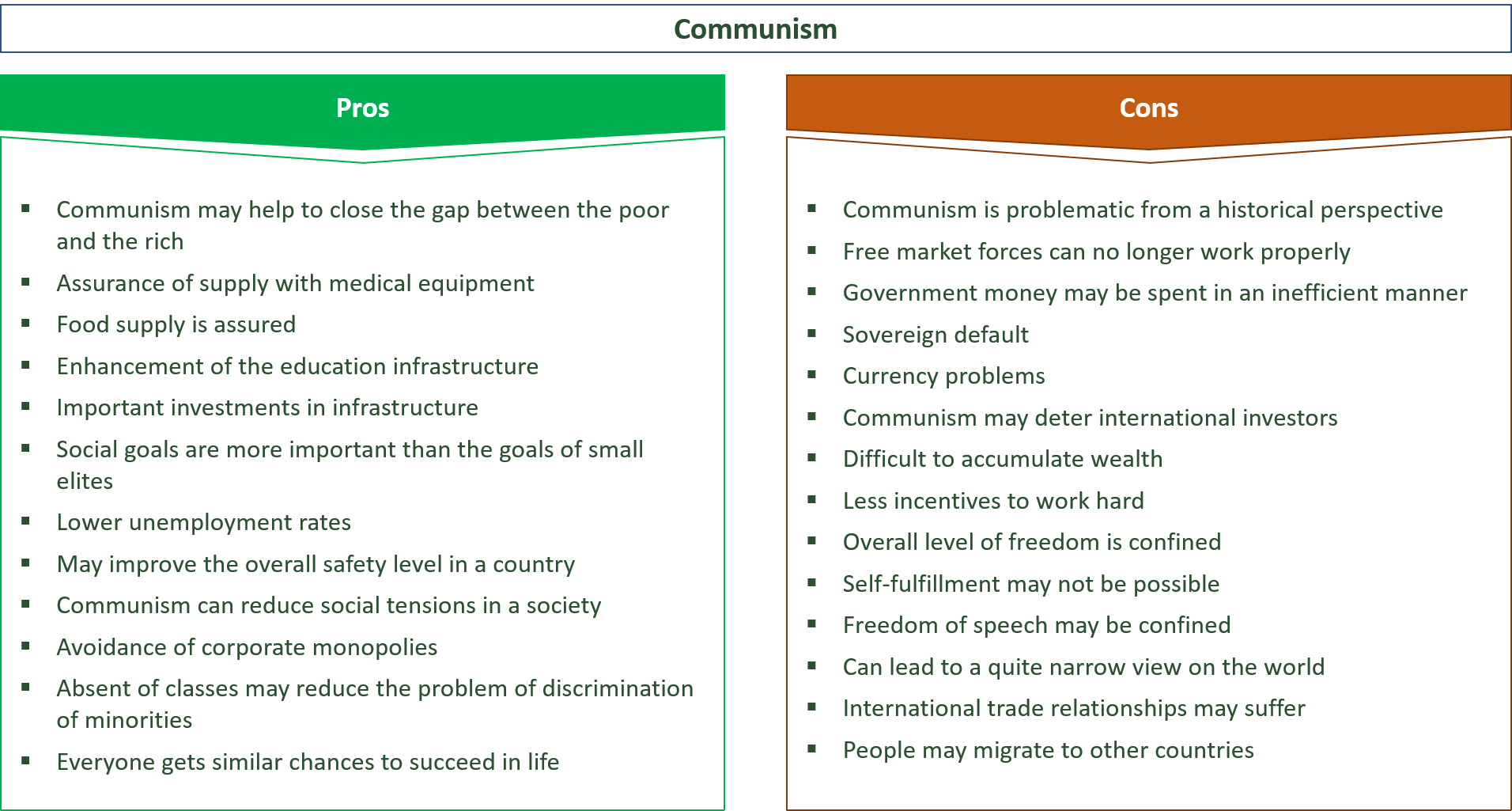“The theory of Communism may be summed up in one sentence: Abolish all private property.”
Karl Marx, Philosopher
Advantages & Disadvantages of Communism

Communism is a political ideology that is still present in a few countries across the globe, the most prominent one being China.
In contrast to capitalism, communism is a political system in which all production is communally-owned and private property is almost non-existent.
In fact, communism can be regarded as a more extreme form of socialism.
While there are some advantages to communism, there are also many problems related to this political concept.
In this article, the pros and cons of communism are discussed.
Audio Lesson
Contents
Advantages of Communism
- Communism may help to close the gap between the poor and the rich
- Assurance of supply with medical equipment
- Food supply is assured
- Enhancement of the education infrastructure
- Important investments in infrastructure
- Social goals are more important than the goals of small elites
- Lower unemployment rates
- May improve the overall safety level in a country
- Communism can reduce social tensions in a society
- Avoidance of corporate monopolies
- Absent of classes may reduce the problem of discrimination of minorities
- Everyone gets similar chances to succeed in life
Communism may help to close the gap between the poor and the rich
One key advantage of communism is that it can help to close the gap between the rich and the poor.
In many countries all over the world, we have a huge wealth gap and a small minority of people owns almost all of the wealth while the general public owns almost nothing.
This can be considered to be quite unfair and politicians often talk about how to close this gap.
One possibility to lower the wealth gap would be to introduce the communist idea since in communism, almost nothing can be owned by people.
This also implies that wealthy people would lose their wealth while the general public would greatly profit from a redistribution of wealth.
Assurance of supply with medical equipment
Communism can also help to assure the supply with important medical equipment in case of emergency.
Since production processes are controlled by the state, the government can decide how much medical equipment should be produced and in case of emergency, the government can simply expand production processes in this field so that everyone gets proper medical treatment.
Hence, the local population may also be better protected against several health issues in a communist regime.
Food supply is assured
In a communist country, the government not only controls the production processes regarding medical equipment, it also controls the food production processes.
As we all know, we need sufficient amounts of food and water in order to be able to survive.
Thus, our food supply is a vital component for a working society and it can make sense that the government controls those crucial processes in order to assure the food supply of the local population.
Enhancement of the education infrastructure
In communist countries, the government often also controls all education facilities.
Therefore, chances are that those educational institutions are also funded with plenty of money in order to assure a high level of education.
This will give more people from families with a low income the opportunity to get proper education, which would otherwise not get this opportunity.
For instance, if you live in a rather capitalistic country, chances are that you will have to pay high tuition fees to attend college and many kids from poor families will not be able to afford this kind of higher education.
Thus, communism can also lead to a higher level of educational equality.
Important investments in infrastructure
Since there will almost be no private property in communist countries, the government is responsible to maintain and to expand the local infrastructure.
This can be quite beneficial for the general public since many important infrastructure projects can be completed in a rather short period of time.
Moreover, most infrastructure projects will aim to benefit the majority of the local population instead of just a small interest group.
Social goals are more important than the goals of small elites
Another upside of communism is that the goals of the general public will be more important than the goals of small elites.
For instance, in many capitalist countries, there is plenty of lobbying when it comes to political decisions and many decisions will benefit a small corporate elite instead of the general public.
Hence, in order to really do what’s good for the majority of the people in a country, communism may be a great way to represent the needs of the general public and to avoid lobbying in political decisions.
Lower unemployment rates
In communism, everyone has to contribute his or her part for the benefit of the general public.
This also means that almost nobody will be unemployed since almost everyone can make a positive contribution in one way or the other.
Therefore, people will stay busy and everyone will make a certain contribution in order to improve the overall living conditions in a country.
May improve the overall safety level in a country
Since the government will have plenty of power through the control of production and employment processes, chances are that this will also increase the overall safety level in a country.
For instance, if someone behaves in an unlawful manner, the government can decide to cancel certain benefits for those people or that those people have to work in jobs with quite poor conditions.
In turn, people will be less eager to break the law.
Communism can reduce social tensions in a society
In many capitalist countries, social tensions have increased substantially over the past decades.
This is often due to the fact that the gap between the rich and the poor increased dramatically, which in turn leads to plenty of frustration for the poor part of society.
Chances are that at one point in time, those poor people will no longer accept the current political system.
In order to prevent this kind of social instability, communism can reduce social tensions since it aims to benefit the general public instead of just a small elite and the wealth gap between the rich and the poor could be closed.
Avoidance of corporate monopolies
In countries where there are free markets and just low levels of political and economic regulations, chances are that big corporate monopolies will form over time which are usually owned by private shareholders as well as by institutional investors.
Monopolies are usually quite harmful to the general public since they often lead to higher prices for the end-consumer and also imply a certain social welfare loss.
Hence, communism can also be quite important to prevent those corporate monopolies to form and therefore, the overall public welfare could be increased through lower product prices.
Absent of classes may reduce the problem of discrimination of minorities
Communism claims to be a classless system where everyone has similar opportunities.
In turn, this also implies that certain minorities will have it easier to get proper education and to succeed in the job market since they will no longer be discriminated against.
In contrast, in many capitalist countries, the discrimination of minorities is still quite prevalent and people who belong to those minorities will have many disadvantages in all parts of their life.
Thus, communism can also improve the chances of minorities in various parts of their life.
Everyone gets similar chances to succeed in life
In general, in a communist country, every citizen should have similar chances to succeed in life.
This means that everyone should have similar access to education, similar chances for good jobs and so on.
Hence, especially for people who are borne with disabilities or other handicaps that might prevent them to have similar opportunities like the general public, communism can be a great system since it will give them more opportunities for a better life.

Disadvantages of Communism
- Communism is problematic from a historical perspective
- Free market forces can no longer work properly
- Government money may be spent in an inefficient manner
- Sovereign default
- Currency problems
- Communism may deter international investors
- Difficult to accumulate wealth
- Fewer incentives to work hard
- Overall level of freedom is confined
- Self-fulfillment may not be possible
- Freedom of speech may be confined
- Can lead to a quite narrow view of the world
- International trade relationships may suffer
- People may migrate to other countries
- Restriction of information flows
- General public can be easily manipulated
- Governments and municipalities have too much power
- Communism can slow down technological progress
- Highly-skilled people may leave the country due to income caps
Communism is problematic from a historical perspective
Apart from the several advantages of communism, there are also some problems related to this political concept.
One downside of communism is that it can be regarded to be rather problematic from a historical standpoint.
Many communist regimes failed over time and also many of the states that currently have communist regimes in place struggle with significant economic problems.
Therefore, communism may not make too much sense from a historical perspective compared to other political regimes like capitalism, which had been more successful on average.
Free market forces can no longer work properly
Another problem with communism is that free market forces will no longer be able to work properly. In free market economies, the price of a good is determined by supply and demand.
However, if the supply of goods is controlled by the government and prices are capped at certain amounts, those free market forces will no longer work, which can result in a serious economic welfare loss over the long run and can also decrease the overall efficiency of production processes in a country.
Government money may be spent in an inefficient manner
Many examples from the past have shown that governments often waste plenty of money on projects that make not too much sense.
Moreover, projects that are planned and carried out by government bodies are often more expensive compared to similar projects that are coordinated by private companies.
Hence, communism can also lead to a state where plenty of taxpayers’ money will be spent in an inefficient manner.
Sovereign default
Communism has often led to sovereign default in the past and chances are that this will also be the case in the future.
The whole structure of communist systems is often not sustainable in the long run since it implies too many frictions.
In turn, governments often spend too much money and the inefficiencies in production processes will often lead to bankruptcy of a state in the long run.
Currency problems
Communist countries also often have problems with their currency.
Currencies from communist countries are usually quite unstable and weak since institutional investors often do not have trust in those currencies and therefore rather sell them instead of buying them.
Moreover, even the local population may not have too much trust in their own currency and therefore, many people will try to exchange their money into foreign currencies in order to be protected against currency depreciation.
Hence, there can also be many sorts of currency problems in a communist country.
Communism may deter international investors
For institutional investors, it is also quite difficult to invest in countries with communist regimes since almost nothing can be owned by private persons or also by private corporations.
Moreover, investors will often also not trust communist regimes since they fear to get expropriated at one point in the future.
Thus, the overall investment volume from private investors will be quite low in those countries, which in turn can lead to serious problems since important projects may not be carried out due to a lack of financial opportunities.
Difficult to accumulate wealth
Since communist regimes often do not allow people to own precious assets, people will also have a quite hard time to accumulate wealth.
Even if they work in demanding jobs for long hours, people will still not be much better off compared to other people who work far less due to the high level of income and wealth redistribution.
However, this can lead to a state where people don’t focus on saving any money since they know that they will not be able to acquire wealth anyways.
In turn, this can lead to quite biased consumption decisions, which can hurt the overall welfare in a country in the long run.
Fewer incentives to work hard
People will also lack motivation to work hard since they know that a high fraction of their income will be taken away from them and they will not be allowed to accumulate wealth.
In turn, many people will just do the bare minimum.
Over the long run, this can lead to a state where plenty of working power is lost solely due to the fact that people are no longer willing to use their full potential since they do not get appropriate returns from working hard.
Overall level of freedom is confined
Another disadvantage of communism is that this kind of political regime greatly confines the overall level of freedom of people.
In many cases, people are not even allowed to choose their profession.
Instead, the government decides which jobs are currently vacant and people may have to work in those jobs for the rest of their lives, even though they might not be interested in those professions at all.
Self-fulfillment may not be possible
In general, it is quite hard for people in communist regimes to really do what they want to do.
People in those regimes are meant to do what’s best for the community and the government and in case individual interests contradict the goals of the community, the goals of the community will often be considered to be more important.
Hence, communism also takes away the opportunity of self-fulfillment of people.
Freedom of speech may be confined
In many communist countries, people also have to be quite careful what they say in public, especially if it is something that contradicts the opinions of the current political regime.
People even have been sent to prison solely due to the fact that they stated their opinion.
Thus, communism can also lead to a state where freedom of speech is greatly confined.
Can lead to a quite narrow view of the world
People who live in communist regimes often also have a rather narrow view of the world.
They are told to behave in a certain manner by the current political regime and are often not encouraged or even allowed to question things.
In turn, also children are often raised with this kind of indoctrination, which can lead to a society which only accepts the values of the state they live in and also reject any other lifestyles.
International trade relationships may suffer
Other countries will also be less eager to engage in trade with communist countries since they often don’t share the same values and also don’t trust those types of regimes too much.
If this is the case, communist countries will suffer from a serious lack of international trade, which in turn can greatly reduce the economic power of the country.
People may migrate to other countries
Due to the many restrictions that are present in a communist regime, many people will also try to leave the country as soon as possible.
In turn, the local population in those countries may significantly decrease over time, which in turn also implies a lower overall GDP and many other economic problems.
Restriction of information flows
Another downside of communism is that the information flows are often also greatly restricted.
Most big media channels are controlled by the government and people are often flooded with information that helps to sustain the current political regime.
Moreover, information that might be harmful to political leaders is often restricted and unavailable for the general public.
This restriction of information flows can lead to a state where people will not be able to understand life in general since they are just indoctrinated with a quite polarized view of the world all day long.
General public can be easily manipulated
Due to those biased information flows in communist countries, people can also be easily manipulated by the government.
In many of these countries, the government media often proposes certain actions to the general public.
However, those actions are not really meant to favor the general public, but rather to favor the current political regime.
Hence, the local population is often even manipulated with the goal to sustain the power of current political leaders.
Governments and municipalities have too much power
Since almost everything is controlled by the government in countries with communist regimes, the government will also have excessive levels of power and leading politicians can almost do everything they want.
However, too much power for institutions is never a good thing and can lead to quite unfair political outcomes in the long run.
Communism can slow down technological progress
Since there will be almost no investments from private corporations in countries with communist regimes, chances are that also the overall technological progress in those countries will be quite limited simply due to a lack of money.
Thus, these countries may also lose competitiveness against other capitalist countries, which will significantly weaken the economic position of those countries.
Highly-skilled people may leave the country due to income caps
Communist countries often also have income caps.
This means that people are not allowed to earn more than a certain amount of money for the respective profession.
However, this will often lead to a state where high potentials will leave the country since they will be able to earn much more in other countries.
In turn, if the best people leave the country, plenty of economic power will be lost over time.

Top 10 Communism Pros & Cons – Summary List
| Communism Pros | Communism Cons |
|---|---|
| Communism can close the wealth gap | Communism can take away freedom of people |
| Better education opportunities | Governments often spend money inefficiently |
| Equal chances for everyone | Free market forces no longer work |
| Assurance of food supply | May distort working incentives of people |
| Supply with medical equipment | People are not allowed to accumulate wealth |
| Communism can help against unemployment | Restriction of information flows |
| Corporate monopolies can be avoided | Trade relationships may suffer |
| May increase social cohesion | Manipulation of the general public |
| Communism may improve overall safety levels | Currency issues |
| Sufficient investments in infrastructure | Sovereign default |
Conclusion
As we can see from the previous analysis, there are many advantages and disadvantages of communism.
While there are some upsides to this political ideology, the cons outweigh the pros in my opinion.
Moreover, also from a historical perspective, communism has led to quite unpleasant political and economic outcomes in most cases.
Hence, other regimes like capitalism may be better suitable to achieve the best possible outcome for the general public.
Sources
https://en.wikipedia.org/wiki/Communism
https://www.britannica.com/topic/communism
https://www.investopedia.com/terms/c/communism.asp

About the author
My name is Andreas and my mission is to educate people of all ages about our environmental problems and how everyone can make a contribution to mitigate these issues.
As I went to university and got my Master’s degree in Economics, I did plenty of research in the field of Development Economics.
After finishing university, I traveled around the world. From this time on, I wanted to make a contribution to ensure a livable future for the next generations in every part of our beautiful planet.
Wanna make a contribution to save our environment? Share it!